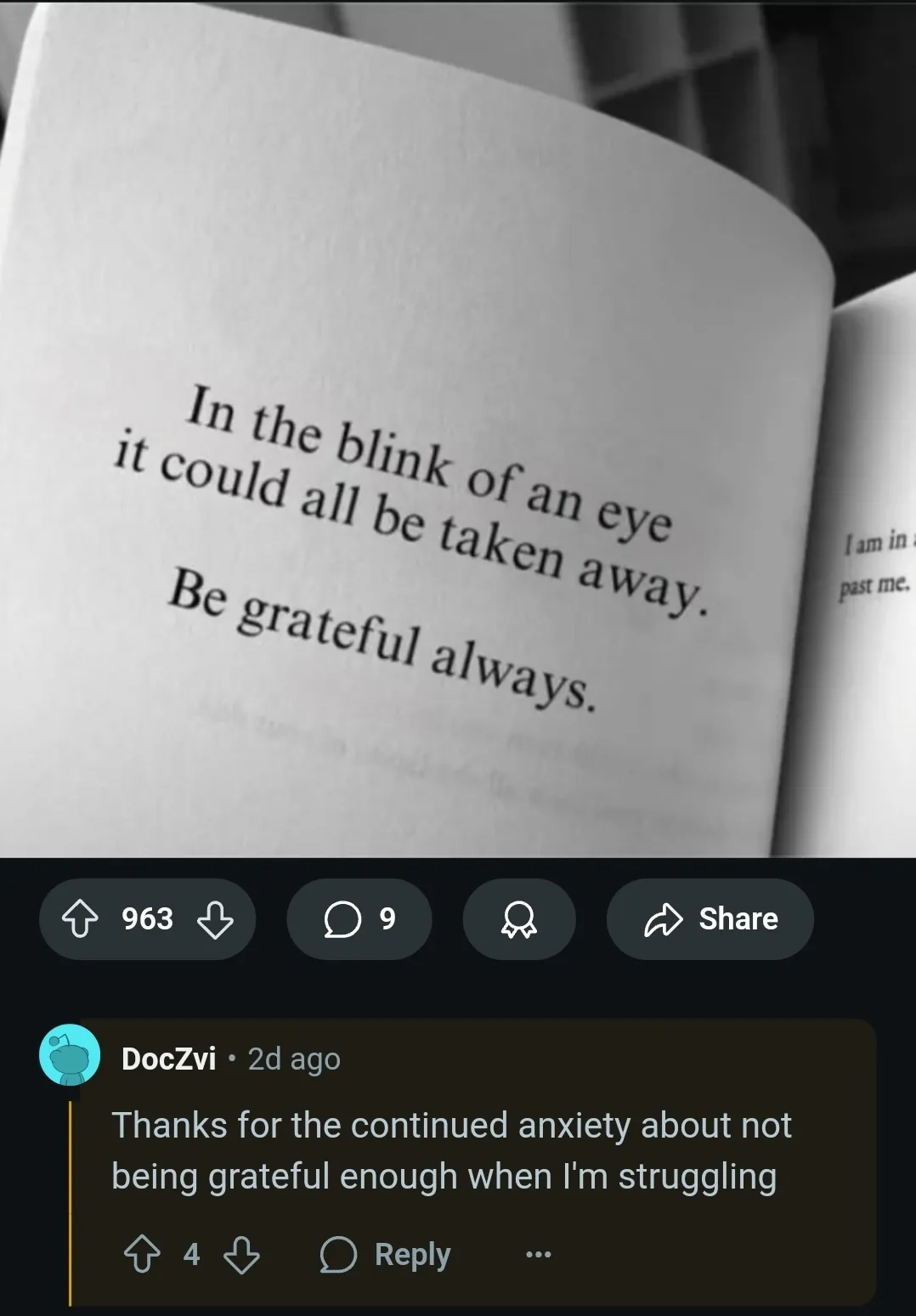
The comment above following this post on Reddit made me chuckle. I realised that through the contrast: both the quote and the comment are two entirely different ways of seeing the world. And this got me thinking about the modern perception of gratitude.
Modern gratitude has become both a balm and a bludgeon. In its pure, unadulterated form, gratitude was supposed to be the quiet grounding to the present. But somewhere along the way, it got hijacked and weaponised. Like so many other habits, it morphed into a tool to fix yourself or to manifest more. A means to an end. A checkbox to be ticked. And in doing that, it turned into this toxic thing because now its a performance. Because if you’re not grateful, you are failing spiritually.
The above quote amuses me, as its basically saying, “Be grateful, or else…”. It imposes a conditionality. Also, the part that says “…everything could be taken away” is an interesting bit.
What is everything? My everything isn’t your everything. Its vague, subjective. Does this also mean when this ambiguous “everything” is taken away, we are no longer allowed to be grateful anymore? Worse, there is this newly established future now. A future where you lose everything. And so your mind goes there. It starts imagining this kind of future. And now you are no longer in the present.
Imagine a person going through some real suffering. They lost their job, or a loved one, and they are absolutely going through it. Suppose they were taught about the habit of gratitude. So they tell themselves, “see, it could be worse, so I can’t wallow. Therefore, I should be grateful”.
Only, this doesn’t really bring any lasting relief. Nothing has changed, if anything, they’ve bypassed their pain, layering guilt on top of grief. Oh boy, now you’ve got another thing to deal with.
There is a beautiful excerpt from the book “When Things Fall Apart” by Pema Chödrön that cuts through it:
I have a friend dying of AIDS. Before, I was leaving for a trip, we were talking. He said, “I didn’t want this, and I hated this, and I was terrified of this. But it turns out that this illness has been my greatest gift.” He said, “Now every moment is so previous to me. My whole life means so much to me.” Something had really changed and he felt that was horrifying and scary had turned into a gift.
What draws me to this is the fact that many people would see having AIDS as the ultimate loss - having everything taken from them. And yet, the friend realised if anything, it was a gift! The gratitude wasn’t forced. It just came naturally, as an extension of the grieving process, and feeling the pain and anguish, do you come out the other side.
Real gratitude doesn’t come from avoiding the struggle, but going through it. Its the fire that purifies, not burns. Because sometimes, not being grateful is the most honest thing you can do. To sit with the rawness. Because once the fire dies down, do you learn to surrender.
So I invite you to see gratitude as surrender. A surrender to the present moment. A humble bow to what is. And this means letting go of the idea of forcing yourself to be grateful.
Something I’ve been practicing recently is gratitude without narrative. While I think its alright to have your “I am grateful for…” or “I should be grateful because…” lists, there is also a form of gratitude, without the commentary. Like a child touching sunlight on the floor. A quiet acknowledgement of the smell of rain, or the way the leaves falls during autumn. A being here in the now. Just as is.